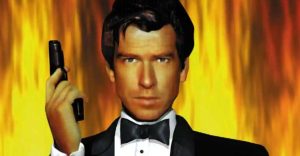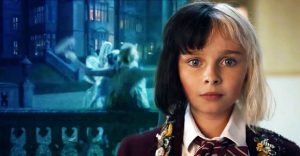Invisible Man: 10 Best HG Wells Inspired Movies And Shows, Ranked According To IMDb

H.G. Wells was one of those writers who was truly a visionary, a man capable of predicting some of the scientific developments that would be key to the 20th (and even 21st) century. His works of science fiction are also some of the hallmarks of the genre, and it is no wonder that he is considered one of its fathers.
It’s also not a surprise that his works have frequently been adapted into film, arguably the ultimate medium of modernity. The recent film The Invisible Man is but one of many works inspired by H.G. Wells. Here are ten others, ranked according to IMDb.
10 The Night That Panicked America (1975)- 7.0

Though a bit cliched in some ways—as some critics noted at the time—this film is still an interesting rendition of one of the most infamous radio broadcasts in the history of the medium. The film portrays the night that Orson Welles read H.G. Wells’ The War of the World aloud, causing widespread panic throughout the United States as some people thought that an actual alien invasion was underway. The film had a truly stellar cast, including Paul Shenar (who played Alejandro Sosa in Scarface) as Orson Welles.
9 Time After Time (1979)- 7.1

This film has a rather intriguing premise. Based on the unfinished novel of the same name by Karl Alexander, it features the author H.G. Wells using his time machine to pursue Jack the Ripper. It’s really a fascinating film, in that it explores various ideas associated with both history and literature. It also stars Malcom McDowell as H.G. Wells and David Warner as Jack the Ripper. It also inspired a TV series in the later 2000s, which unfortunately was canceled after only five episodes.
8 The Invisible Man (1984)- 7.1

The Invisible Man seems to be one of Wells’s novels that has inspired the most adaptations in film. Perhaps it’s because there’s just something so chilling about the idea of a human being who is rendered invisible to others. This is a very faithful adaptation of the original novel, which makes sense, considering that it was spread out over six episodes (thus giving it more space in which to develop the plot of the novel). Some complained about the fact that it was a bit slow, it proved to be very popular outside of Britain.
7 The War of the Worlds (1953)- 7.1

There’s no question that the 1950s were a time of both promise and deep uncertainty, with the atomic bomb always a potential threat of all life on earth. One can see these anxieties on display in this 1953 adaptation of the famous novel. It does take some liberties with the original novel, such as transplanting the story from Victorian England to southern California. It was well-received by critics at the time, and it has gone on to have a profound influence on subsequent science fiction films and television series.
6 The Passionate Friends (1949)-7.2

Though Wells was, of course, best known for his science fiction novels, he also wrote other types of fiction, such as the novel The Passionate Friends, about a woman who is having an affair on her husband. The film version, released in 1949, is a fine film, starring Ann Todd, Claude Rains, and Trevor Howard as the woman, her husband, and her lover respectively. It was directed by David Lean, who would go on to direct such famous epic films as The Bridge on the River Kwai, Lawrence of Arabia, and Doctor Zhivago.
5 Island of Lost Souls (1932)- 7.4

One of Wells’s most disturbing novels is The Island of Dr. Moreau, about a man who is shipwrecked on an island ruled over by a scientist attempting to transform animals into humans through experimental tactics. This film version has a truly exemplary cast, including both the delightful Charles Laughton as the egomaniacal Dr. Moreau and Béla Lugosi as the Sayer of the Law.
It was deemed so controversial in the UK that it was denied a certification by the film censors. Though there have been other adaptations of Wells’s novel, this is widely regarded by critics as the one that deserves the most respect.
4 The Invisible Man (2000) (TV Series)- 7.5

Sometimes, a television series can explore the philosophical issues raised by Wells’s original novel in a way that film simply cannot. That is certainly the case with this 2000 television series, which makes a number of changes to the source material. It focuses on a former thief who is recruited by a spy agency and given various enhancements that renders him invisible. It starred the actor Vincent Ventresca in the title role (he would later become famous for both a guest role in Friends and for a role in Boston Common).
3 The Time Machine (1960)- 7.6

This charming adaptation of Wells’s film The Time Machine stars Rod Taylor and Alan Young (who would later become famous for playing the voice of Scrooge McDuck in Ducktales). It was produced by the studio MGM, so it goes without saying that the production values were top-notch. It received mostly good reviews from critics, though some noted that the storytelling was a bit slow. Most reviewers, however, were unanimous in agreeing that the film’s special effects deserved praise, and the film was nominated for and won the Academy Award for Best Special Effects; it helped cement the place of time travel in modern entertainment.
2 The Invisible Man (1933)- 7.7

There’s something especially haunting about the horror films produced in the 1930s. Perhaps it’s the black and white cinematography, or perhaps it’s the fact that Hollywood was still experimenting. Whatever it is, that powerful haunting is definitely present in the 1933 adaptation of The Invisible Man, which starred Claude Rains (appearing for the first time in American film). It has since become an iconic piece of cinema, influencing, to some degree, most of the subsequent adaptations of the novel. It was also inducted into the National Film Registry of the Library of Congress in 2008.
1 A Trip to the Moon (1902)- 8.2

This film, one of the most important and sophisticated short films produced in the early history of cinema, was made by the French filmmaker Georges Méliès. It tells the story of a group of scientists who develop a way to travel to the moon, where they encounter a tribe of moon men. Most historians believe that it was influenced by a number of books of the time, including those written by Jules Verne and H.G. Wells’s The First Men in the Moon (which was published very shortly before the film was made).
About The Author

















